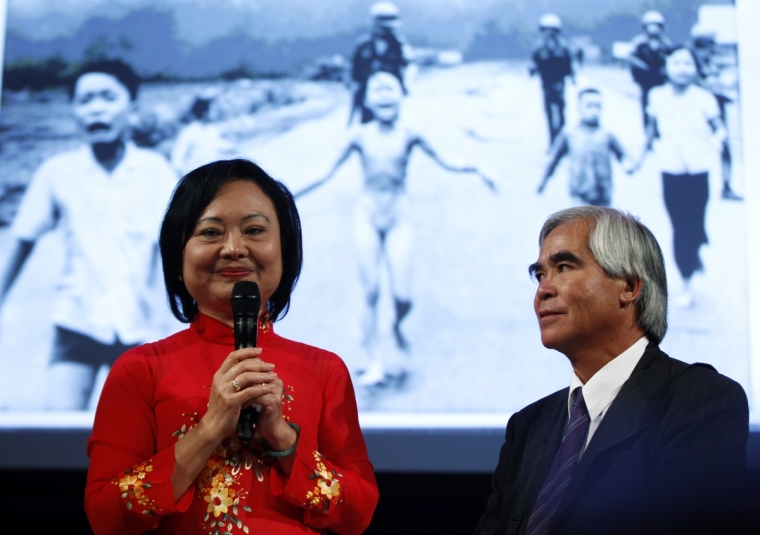Girl from Vietnam War napalm photo finds she's not 'too ugly' for Christ to love

NEW YORK (Christian Examiner) – The image of a 9-year-old Vietnamese girl, running down a road naked and burned, arms outstretched in agony is one of the enduring images of the destruction of the Vietnam War.
Phan Thi Kim Phuc, the little girl in the 1972 Pulitzer prize-winning photo, is now finally receiving treatments to help the painful, leathery scar tissue on her back to heal, 43 years after the incident that forever changed her life, CBS News has reported.
She has also found a much deeper type of healing through her faith in Christ.
Phuc, who now lives in Canada, was in her village on the morning of June 8 when South Vietnamese forces were locked in a vicious fight with the North Vietnamese Army (NVA). The South Vietnamese Air Force dropped its payload of napalm directly on the village in the effort to rout the enemy.
Among the book I read was the Bible, the New Testament. ... That is amazing turning point in my life. When I became a Christian, I just have so much peace in my heart. I trust that God will open a door for me.
The napalm found her, as much as it did the enemy. Her clothes burned off her body and she was "baked" on her arms, her back and her chest. As she ran down the road, Vietnamese Associated Press photographer Nick Ut snapped the now famous photo, just before South Vietnamese soldiers began pouring water on her burns. She was wrapped in a poncho and sent to the hospital.
"They place me to the morgue because they give up," Phuc told CBS News correspondent Jane Pauley. "They consider that I have no way to survive."
But she did – after 14 months and 17 surgeries.
"God not finished with me yet," Phuc thought at the time, even though she didn't know God and didn't believe she had any hope for a good life with a husband and children.
"I got burned and I become ugly. People would see me and they would turn away," Phuc said. "It filled me up with hatred, bitterness and anger."
Phuc attempted to go to school, but the pain was too much. She was also constantly distracted by repeated interviews with foreign news agencies, where she was trotted out as a type of Vietnamese national hero for the communists – a symbol of the pain inflicted on the country by outsiders.
Inside, she was unhappy.
"I just want simply to find a purpose for my life. Why I still alive?" Phuc asked.
Phuc said she then went to a place where she often found a little quiet and an escape from the pressures of life – the library. Tucked on the shelves was an old copy of the Bible.
"Among the book I read was the Bible, the New Testament," Phuc said. "That is amazing turning point in my life. When I became a Christian, I just have so much peace in my heart. I trust that God will open a door for me."
He did.
Phuc had a chance encounter with then Prime Minister Pham Van Dong, who sent her to study in Cuba. There, she met her future husband. She and Toan Huy married shortly thereafter, and then on a return trip to Vietnam, both of them defected to Canada. They have lived there since.
"The girl in the photo" began to speak at churches about her story, but she was still in incredible pain from her injuries. She pushed through it for years.
"I pray and I set up my mind to never concentrate on my pain," Phuc told CBS News, admitting that she sometimes hated her life. "I cannot wait to go to heaven to enjoy the no scar, no pain."
Then, after Phuc spoke to a congregation, one of its members offered the services of his daughter-in-law, Jill Waibel, a Miami dermatologist who specializes in removing burn scar tissue with a laser. Phuc accepted and is now in the process of having the painful scars removed.
The laser penetrates the scar tissue, zapping away small portions of it to allow the skin to heel in a controlled manner. The process could still take more than a year.
Nick Ut, the photographer who took her picture in 1972, is documenting the treatments – the treatments of a friend with whom he forged a life-long relationship in the cauldron of war more than four decades ago.
"He's the beginning and the end," Phuc said of the man she called "Uncle Ut" during an interview with the Associated Press. ''He took my picture and now he'll be here with me with this new journey, new chapter."